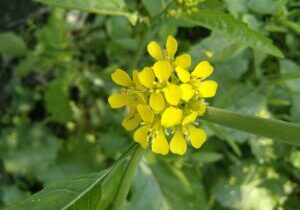A Mustard Seed Story
 Jesus’ parable of the mustard seed in the gospel of Mark always brings a smile to my face.
Jesus’ parable of the mustard seed in the gospel of Mark always brings a smile to my face.
When I was a girl, my mother always made dill pickles. She used the same recipe her mother, grandmother, sisters, and brothers used. But each family’s pickles tasted a bit different.
No one knew why that should be until one of my aunts, who was a home economics teacher, decided to experiment with the ingredients. She made pickles one day using the same batch of cucumbers and dill from the garden, and the same brine. Then she put identical amounts of all but one ingredient into the jars. Each jar had one ingredient in a larger amount than the other jars did. Several months later, when the cucumbers had matured into dill pickles, she tasted them. The key to the spiciness of her pickles in comparison with those of all the rest of the family turned out to be the amount of mustard seed she put in the jars. She used a heaping measure of the seed. Others used a level one.
The mustard seed we all use(d) for pickles is a relatively large seed. It’s far from being “the smallest of all the seeds on the earth” as is the seed described by Jesus in St. Mark’s gospel. However, these mustard seeds were the only ones I had ever seen.
When I began teaching fifth and sixth grade religious education classes, I included this parable among the ones I shared with the children. I brought some of the seeds with me to class and asked them to glue them into their books on the page on which they had written a bit of the parable and drawn a picture of a tree with birds in it. I always cautioned them not to eat any of the seeds. Invariably, one of the boys would taste one anyway. He would then need to race from the room to get a drink of water! They asked why I had given them something so spicy and I would remind them that I had told them not to taste them.
Still, I wondered about the description of these seeds as being the smallest on earth. I knew that lettuce seeds and snapdragon flower seeds were much smaller.
Then I met Paul. Paul was from India and came to live with us for a while. He introduced me to South Asian foods, including curries, chapattis, and other delights. One of the ingredients he used was mustard seed. This was a tiny brown seed, not much bigger than the period at the end of a sentence. It was not the big yellowish one we used for pickles. It gave a lovely richly spicy flavor to the food, though it was subtle when used appropriately in the recipes.
When I met this variety of mustard, I began to understand the parable of the mustard seed. A tiny little seed could indeed make a big difference in the flavor of a food. It could grow into a much larger plant as well. Birds and other animals could thrive in its shelter.
Was the mustard seed of which Jesus spoke really the same as these mustard seeds used in cooking? Maybe not. There is a plant known as a mustard tree that grows in the Middle East. It has yellow flowers and tiny seeds. It’s more of a shrub than a tree, but it can grow to be up to 20 feet tall
Whether or not the seeds we identify as mustard seeds for cooking are the same ones Jesus mentioned is really not the important thing. What matters is that very small things can grow into much larger ones and have an effect far greater than their size.
The kingdom of God is truly like the mustard seed. It appears in very small and unobtrusive ways. No one would think twice about it or about the prospect that it could be important in any way. Yet as the poor receive food, clothing, shelter, opportunities, respect, health care, and other necessities of life, as justice (the right order of things) is restored, the kingdom begins to blossom and grow. God works with tiny things to bring about great wonders. A shoot from a tree can grow into a massive new tree high upon a mountain. A tiny seed can grow to be a beautiful flower or a tall tree sheltering birds and other creatures. And the harvest of justice marks the arrival of the Kingdom of God.










